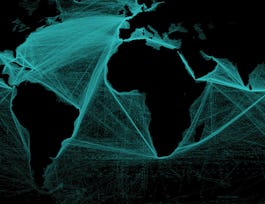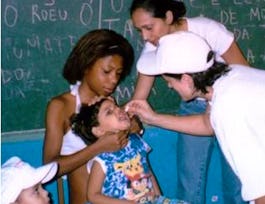This fifth and final course is centered on planetary health as a fundamental health determinant. As we consider how the health of humans is dependent on the health of Earth’s natural systems, we will also explore how to apply futures thinking and foresight principles to planetary health initiatives. The topics of this course include:

Schenken Sie Ihrer Karriere Coursera Plus mit einem Rabatt von $160 , der jährlich abgerechnet wird. Sparen Sie heute.


Social Determinants of Health: Planetary Health
Dieser Kurs ist Teil von Spezialisierung Social Determinants of Health: Data to Action


Dozenten: Daniel J. Pesut, Ph.D., RN, FAAN
Bei  enthalten
enthalten
Kompetenzen, die Sie erwerben
- Kategorie: Health Informatics
- Kategorie: Data Analysis
- Kategorie: Health Equity
- Kategorie: Planetary Health
- Kategorie: Data Visualization
Wichtige Details

Zu Ihrem LinkedIn-Profil hinzufügen
8 Aufgaben
Erfahren Sie, wie Mitarbeiter führender Unternehmen gefragte Kompetenzen erwerben.

Erweitern Sie Ihre Fachkenntnisse
- Lernen Sie neue Konzepte von Branchenexperten
- Gewinnen Sie ein Grundverständnis bestimmter Themen oder Tools
- Erwerben Sie berufsrelevante Kompetenzen durch praktische Projekte
- Erwerben Sie ein Berufszertifikat zur Vorlage


Erwerben Sie ein Karrierezertifikat.
Fügen Sie diese Qualifikation zur Ihrem LinkedIn-Profil oder Ihrem Lebenslauf hinzu.
Teilen Sie es in den sozialen Medien und in Ihrer Leistungsbeurteilung.

In diesem Kurs gibt es 5 Module
The field of planetary health is based on the idea that the health of humans is dependent on the health of Earth’s natural systems. This module introduces the concept of planetary health and explains how it can be used as a framework for understanding other social determinants of health. The first lesson provides an overview of planetary health as a discipline, paradigm and movement. Lesson two explores the Indigenous origins of planetary health, and how the Great Acceleration has rapidly increased anthropogenic changes to the environment. Finally, in lesson three, we examine how planetary health addresses environmental determinants of health.
Das ist alles enthalten
4 Videos6 Lektüren2 Aufgaben1 Diskussionsthema1 Plug-in
Module 2 builds on what you learned in the previous module, as we take a more in depth look at planetary boundaries and the key data supporting our current understanding of planetary health. Climate change is not the only issue we are facing, and in lesson two, we investigate the broad range of environmental issues caused by humans and the resulting human health impacts of these disruptions. In lesson three, we take a look at the 12 cross-cutting principles of planetary health education which define the guiding themes and values of the emerging field. These principles provide a foundation for the growing interest and efforts in the field. We wrap up this module by looking at sources of planetary health knowledge, as we begin to reflect on how we can all take action in improving planetary health.
Das ist alles enthalten
5 Videos4 Lektüren2 Aufgaben1 Diskussionsthema1 Plug-in
In this module, we will explore movement building and emerging evidence-based planetary health solutions as we discuss how to combat the complex environmental issues covered in previous modules. Lesson one introduces the idea of The Great Transition, which will require innovation across fields and collaboration across social sectors to address planetary health concerns. We will also review organizations focused on evidence-based climate change solutions. In lesson two, we will analyze strategies for organizing an effective movement to enact widespread planetary health initiatives that will create change on a global scale. While the issue of planetary health can seem overwhelming, lesson three offers reasons to be hopeful for the future, as we consider the changes we can make in our own life to address planetary health issues.
Das ist alles enthalten
5 Videos5 Lektüren2 Aufgaben1 Diskussionsthema2 Plug-ins
The purpose of this module is to introduce the concept of futures literacy and foresight leadership as people tackle the challenges of planetary health initiatives. People who want to bridge innovations across contexts must become time-conscious, future literate and embrace the dynamics of appreciation, influence and agency as they navigate change and transformation efforts. The development of futures literacy involves attention to the development and cultivation of futures thinking and foresight leadership. In part one, foresight is defined and several types of foresight leadership styles are described. In part two, strategies to develop foresight leadership are described and people are invited to apply futures thinking and foresight principles and practices to planetary health initiatives.
Das ist alles enthalten
2 Videos4 Lektüren2 Aufgaben1 Diskussionsthema2 Plug-ins
This module will focus on analyzing, displaying and interpreting social determinants of health data, with a particular focus on predicting health outcomes based on various social determinants of health and environmental variables. Lesson one will provide an overview of regression analysis and scatter plot visualization. In lesson two, we will learn how to conduct regression analyses and create scatter plots in R. Using the NHANES dataset, we will predict general health status based on age, BIPOC, marital status, education, household size, income, insurance, BMI, depression, smoker, and drinks/day. Using the Omaha System dataset, we will predict final status score based on baseline status score, BIPOC, marstat and social determinant of health variables. Finally, we will discuss how to interpret the results of our analysis as we visualize our findings using line graphs and scatter plots.
Das ist alles enthalten
2 Videos4 Lektüren1 peer review1 Diskussionsthema1 Unbewertetes Labor2 Plug-ins
Dozenten


Empfohlen, wenn Sie sich für Health Informatics interessieren

Princeton University

Johns Hopkins University

Johns Hopkins University

Universiteit Leiden
Warum entscheiden sich Menschen für Coursera für ihre Karriere?





Neue Karrieremöglichkeiten mit Coursera Plus
Unbegrenzter Zugang zu über 7.000 erstklassigen Kursen, praktischen Projekten und Zertifikatsprogrammen, die Sie auf den Beruf vorbereiten – alles in Ihrem Abonnement enthalten
Bringen Sie Ihre Karriere mit einem Online-Abschluss voran.
Erwerben Sie einen Abschluss von erstklassigen Universitäten – 100 % online
Schließen Sie sich mehr als 3.400 Unternehmen in aller Welt an, die sich für Coursera for Business entschieden haben.
Schulen Sie Ihre Mitarbeiter*innen, um sich in der digitalen Wirtschaft zu behaupten.
Häufig gestellte Fragen
Access to lectures and assignments depends on your type of enrollment. If you take a course in audit mode, you will be able to see most course materials for free. To access graded assignments and to earn a Certificate, you will need to purchase the Certificate experience, during or after your audit. If you don't see the audit option:
The course may not offer an audit option. You can try a Free Trial instead, or apply for Financial Aid.
The course may offer 'Full Course, No Certificate' instead. This option lets you see all course materials, submit required assessments, and get a final grade. This also means that you will not be able to purchase a Certificate experience.
When you enroll in the course, you get access to all of the courses in the Specialization, and you earn a certificate when you complete the work. Your electronic Certificate will be added to your Accomplishments page - from there, you can print your Certificate or add it to your LinkedIn profile. If you only want to read and view the course content, you can audit the course for free.
If you subscribed, you get a 7-day free trial during which you can cancel at no penalty. After that, we don’t give refunds, but you can cancel your subscription at any time. See our full refund policy.

